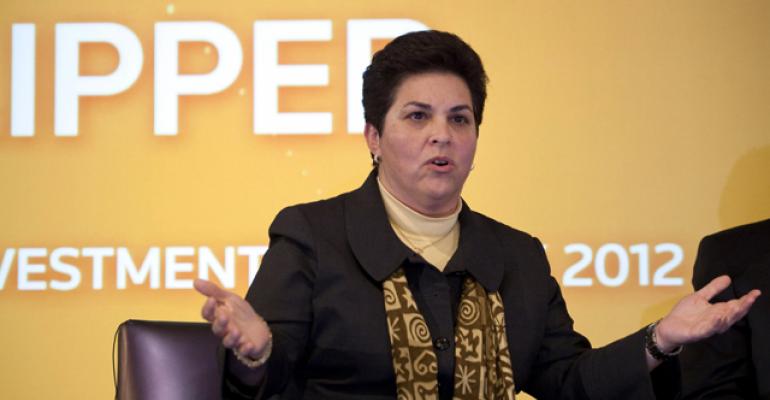
During Lipper’s 2012 outlook event last night, Lisa Shalett, chief investment officer of Merrill Lynch Wealth Management, provided a gloomy outlook for the U.S. markets for 2012, unless Europe gets its act together and the U.S. can get past the gridlock in Washington. According to Shalett, what happens to global GDP will be key:
“What folks need to remember is that the S&P 500 is not that all that levered to U.S. GDP anymore; it’s actually levered to global GDP,” she said. “Yes, the U.S. has shown some level of local, or domestic, resilience, but the question is how quickly is that resilience going to be tested by what’s really going on globally.”
The only way the banks in Europe are going to recapitalize is by deleveraging, pushing loans and pulling liquidity out, she said. They could pull out $3-$4 trillion over the next two years, which would have a major drag on global GDP growth.
“Almost all the measures that are being brought in to reduce the panic out there affect the growth rate,” said Colin Moore, chief investment officer for Columbia Management Investment Advisors, during the panel discussion. That’s because those measures revolve around deleveraging. Moore also doesn’t buy the argument about global decoupling; countries are more linked than ever, he said.
Shalett said we’re in for an interesting 2012, as seven major democracies in the G20 are going to see new elected officials, including Italy, France and the U.S. And they’re all faced with the big question of how to navigate debt and deleveraging.
“As far as the United States goes, I think having clarity and certainty is one element, but I think regardless of who’s elected, the question is going to be can we get from a place where it used to be perceived that gridlock in Washington is a good thing for markets, because nothing much would get done, to a place where the markets need something to get done.”
Unlike Italy, which does not know how to fix the problems, the U.S. has the math to fix its problems, but, “The issue in the United States is political will,” Shalett said. “This is not the unknown unknown—the thing that investors lose sleep at night; this is the known known, and we just haven’t gotten it done.”
In normal times, gridlock is good for the markets, but these aren't normal times. We’ve got to get passed this place where absolutely nothing gets done…

